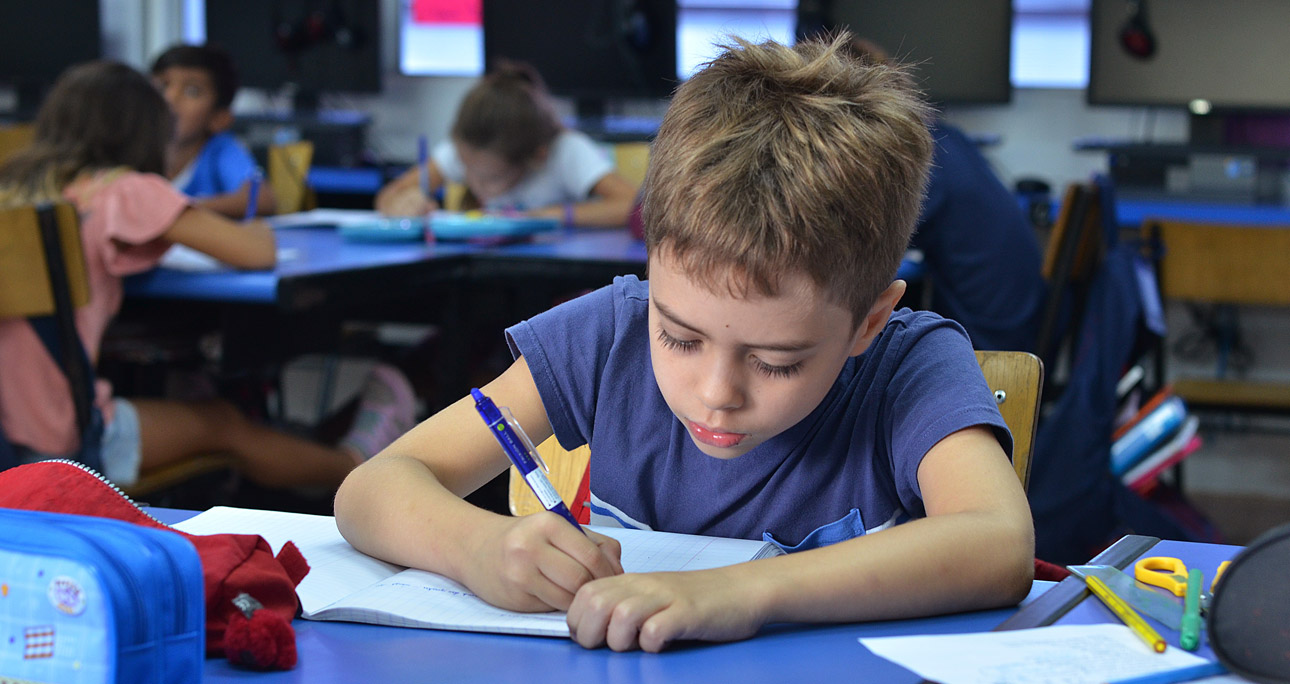ELEMENTARY SCHOOL
From 6 years old to 11 years old : CP, CE1, CE2, CM1, CM2 (Year 2 to Year 6).
The French School in Kuala Lumpur opened its new primary school, Hevea on the 1st of July 2020. With brand new facilities, the school is also accessible by foot, 100 meters away from the current LFKL school.
Hevea welcomes children from the age of 3 to 8 years old in a safe, spacious and green environment.
Hevea is open to non-French speaking students from the “Très Petite Section” (Pre-nursery) to the “CE2” (year 4 of primary school), so from the age of 3 to 8 years.
The school provides new facilities such as swimming pool, a colourful playground, a canteen, activity and napping rooms adapted for small children.
Pupils in CM1 to CM2 (aged 9 to 11) are then accommodated in the LFKL building.
The Primary School Cycles
The National Curriculum for the primary school defines for each educational domain the knowledge and skills to be attained within each cycle :
• The Early Learning Cycle (Petite, Moyenne and Grande sections of the Kindergarten);
• The Basic Learning Cycle (Grande section of the Kindergarten, CP and CE1);
• The Consolidation Cycle (CE2, CM1 and CM2)
Regular evaluations by the teachers ensure assessment of the knowledge acquired by students and their level; they will contribute to the validation of the intermediary stages of the mastery of the Common Base of Knowledge and Skills. They are sent to the families and encourage useful dialogue to monitor the children’s schooling.
SCHEDULE
| Monday | Tuesday | Wednesday | Thursday | Friday | |
|---|---|---|---|---|---|
| School hours in the morning | 8am – 11.30am | 8am – 11.30am | 8am – 12pm | 8am – 11.30am | 8am – 11.30am |
| Number of school hours in the morning | 3h30 | 3h30 | 4h00 | 3h30 | 3h30 |
| Lunch time | 11.30am – 12.45pm | 11.30am – 12.45 pm | 11.30am – 12.45 pm | 11.30am – 12.45 pm | |
| School hours in the afternoon | 12.45 pm – 2.45 pm | 12.45 pm – 2.45 pm | 12.45 pm – 2.45 pm | 12.45 pm – 2.45 pm | |
| Number of school hours in the afternoon | 2h00 | 2h00 | 2h00 | 2h00 | |
| Total of class hours per day | 5h30 | 5h30 | 4h00 | 5h30 | 5h30 |
| Number of class hours per week | 26 hours | ||||
| complementary educational activity or homework assistance (optional) | 3pm – 4.15pm | 3pm – 4.15pm | 3pm – 4.15pm | 3pm – 4.15pm | |
| After school activities | 3pm – 4.15pm | 3pm – 4.15pm | 1.15pm – 2.45pm | 3pm – 4.15pm | 3pm – 4.15pm |
SCHOOL SUBJECTS (CP-CE1-CE2 / Year 2-3-4)
| School subjects | Yearly hours | Weekly hours |
|---|---|---|
| French | 360 hours | 10 hours |
| Maths | 180 hours | 5 hours |
| Modern languages | 126 heures | 3h30 |
| Sports | 108 hours | 3 hours |
| Arts | 72 hours | 2 hours |
| Moral and civic education | 90 hours | 2h30 |
| TOTAL | 936 hours 26 hours | |
SCHOOL SUBJECTS (CM1-CM2 / Year 5 - Year 6)
| School subjects | Yearly hours | Weekly hours |
|---|---|---|
| French | 288 hours | 8 hours |
| Maths | 180 hours | 5 hours |
| Modern languages | 126 heures | 3h30 |
| Sports | 108 hours | 3 hours |
| Arts | 72 hours | 2 hours |
| history and Geography | 72 hours | 2 hours |
| Moral and civic education | 90 hours | 2h30 |
| TOTAL | 936 hours 26 hours | |



